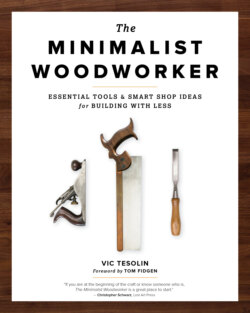Читать книгу The Minimalist Woodworker - Vic Tesolin - Страница 12
На сайте Литреса книга снята с продажи.
ОглавлениеI think we were lulled into the myth that power tools are more accurate than
hand tools. In some cases this may be true but machines still need to be tuned and
maintained to retain their accuracy. My question is—how accurate do you need
to be? One of the characteristics of wood is that it is always taking on and losing
water via the humidity in the air. A freshly dimensioned board can change over the
time it takes to eat lunch so why pull out the calipers and micrometers to check
dimensions? I think people feel that they can compensate for a lack of experience
by trying to work to ultra-high tolerances to ensure success. I once had a student
who was concerned when making a tabletop that one corner was thicker by 0.004"!
That is the thickness of a piece of printer paper.
The machines I choose to keep in my shop save me hours of hard labor but in
the end, I could drop them all and still be able to woodwork.
THE POWER OF THE HOBBYIST
I hear many woodworkers describe themselves as ‘only a hobbyist’ when asked
about what they do in the shop. The part I take exception with is the ‘only.’ Hobbyists
think for some reason that they aren’t as qualified as a woodworker if they are
not making money at it. I happen to think that some of the best woodworkers are
those who don’t have the pressures of running a business looming constantly over
their heads like a dark cloud. When I made furniture for a living I was constantly
stressed about finishing one job and lining up the next one in order to make ends
meet. Being a hobbyist allows you the freedom to explore new things and try new
techniques without worrying about putting food on the table. You can spend time
actually mastering skills. And if something doesn’t work out you can drill a hole in it
and call it a birdhouse.
About three years ago I started experimenting with axes—not juggling them while
they’re on fire but using them as a way to remove material quickly. It took some time to
learn how to sharpen and use axes but after some blood (literally) and sweat I worked
it out. Now I use axes quite often in my shop. The point is, I would not have had the
time to try this new (to me) technique if I were woodworking for a living. I would have
stuck with my same old techniques because you don’t get paid to experiment.
HAND TOOLS—A LOVE AFFAIR?
The majority of the tools in my shop do not have a motor on them. I do this because
I enjoy using them. I’m not intrigued by the romance of them. I don’t care who made
them or when. I pick tools that get the job done.
